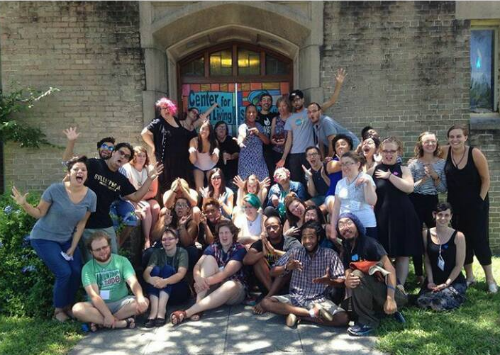Creating Space to Grow Racial Justice
It had happened again. Another black man had been shot dead by police, another life lost to the brutality of racism, another painful reminder of the urgency of the Movement for Black Lives. News of Philando Castile’s death in Minnesota came less than a day after the police shot Alton Sterling in Baton Rouge. They weren’t the last to die; in recent weeks, other men, women, and transgender people of color have been killed just for being themselves – and not just by police. These tragedies, and the long-standing systems of oppression behind them, weigh heavily on all who seek to defy hate.
A few days later, 30 young adults gathered in the sanctuary of the First UU Church of New Orleans for the opening worship of Grow Racial Justice. They sat in a circle around the steady flame of a chalice, and to the rhythm of a beating drum, spoke their intentions in turn: Healing. Courage. Compassion. Humility. Rigor. Accountability. Resistance. Community. Clarity. Love.
For the next five days, Grow Racial Justice offered participants the tools, resources, and relationships to support their racial justice leadership. The UU College of Social Justice and the UUA’s Thrive Program for Youth & Young Adults of Color organized the retreat and training, in in collaboration with two other groups: Standing on the Side of Love, and the Center for Ethical Living and Social Justice Renewal. As the struggle for racial justice lives on in our streets and courtrooms, congregations and communities, it was a timely opportunity for young activists to deepen their faith, lift their spirits, build community, and develop skills for organizing within and beyond Unitarian Universalism.
In two uniquely tailored, parallel programs, young adults of color and white young adults explored their racial and ethnic identities, reflected on the effects of internalized racism, and considered how their own experiences compel them to action. They shared stories, struggles, songs, and practices of resistance and resilience. The two groups then came together to learn skills in anti-racist facilitation and grassroots organizing from long-time movement leaders Aesha Rasheed and Caitlin Breedlove. They left with a shared commitment to lead the work required to advance racial justice in their home communities and within themselves.
Participants echoed one another in reflecting on the value of the program. One young adult of color shared, “My time at Grow helped me form a deep, action-oriented commitment to racial justice. I’ve been inspired to preach sermons that speak the truth about racial (in)justice and my own experiences, to volunteer with my local Black Lives Matter chapter, and to be public with my own actions, thoughts, and struggles in the fight for racial justice. I can do all of this because I know there is a community of support, helping me move forward.”
 Another participant from the white cohort added, “I believe Grow transformed my work from ‘facebook activism’ into true action. I better understand how organizing for change means matching commitment with a plan for how to do it… If we truly want to show up for the world in the ways our principles commit us to, we need to do white-on-white work to dismantle white supremacy.”
Another participant from the white cohort added, “I believe Grow transformed my work from ‘facebook activism’ into true action. I better understand how organizing for change means matching commitment with a plan for how to do it… If we truly want to show up for the world in the ways our principles commit us to, we need to do white-on-white work to dismantle white supremacy.”
A third, who participated in the Thrive cohort, said, “This was a life-changing experience – physically, mentally, and most important, spiritually. I can’t wait to create movements with these people.”
Shortly after Grow Racial Justice concluded, the UU College of Social Justice brought together 15 teenagers for Activate New Orleans: Racial Justice and the Beloved Community, also hosted by the Center for Ethical Living and Social Justice Renewal. Like the participants in Grow, the youth left this training with new bonds of friendship, a deeper understanding of systemic racism, and a stronger commitment to taking the next steps in their social justice journeys.
Too much hateful rhetoric has filled the airwaves this year. Unrelenting acts of racist aggression continue to distress and dishearten us. Still, the voices of the young leaders who joined us at Grow and Activate Racial Justice offer hope. They remind us that joining together to defy hate through personal transformation and strengthened activism can help us undo racism and foster our collective liberation.
—
